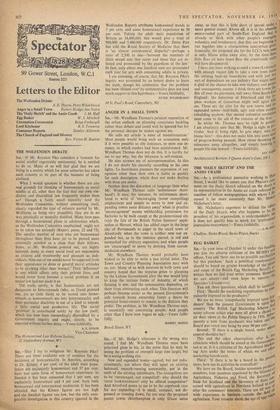ANGER IN A SMALL TOWN
SIR,—Mr. Wyndham Thomas's petulant exposition of the urban outlook on planning constitutes heckling rather than debate and could well be ignored but for the personal charges he makes against me.
He calls my article 'a mine of misinformation.' Most people would bring such an accusation only if it were possible to cite instances, or even one in- stance, in which readers had been misinformed. Mr. Wyndham Thomas does not do this. It is hardly for me to say why, but the inference is self-evident.
He also accuses me of misrepresentation. In this I do not doubt his sincerity according to his own lights. To doctrinaire planners the expression of any opinion other than their own is liable to qualify for such description, which does not make dealing with them any easier.
Neither does the distortion of language (into what Mr. Wyndham Thomas calls 'unfortunate short- hand'). It may, for instance, be unfortunate short- hand to write of 'encouraging (never compelling) employment and people to move to new and ex- panding towns some distance away' when in practice 'encouragement' means withholding permission for factories to be built except at the predetermined site (vide the fate of the British Nylon Spinners' appli- cation at Havant, which has added anger in the large city of Portsmouth to anger in the small town of Alresford); when the town is neither new nor ex- panded but, as in the instance quoted, is old and earmarked for abitrary expansion; and when people are 'encouraged' to move by denying them accom- modation elsewhere.
Mr. Wyndham Thomas would probably have wished to be able to write a less trivial letter. The Town and Country Planning Association may wish so, too. Many of us with interests in both town and country hoped that the impetus given to planning by the Labour Government after the war would help to keep the various forms of industry, of which farming is one, and the communities depending on them from obstructing each other. This function will perhaps 'become easier as the present Government's aids towards home ownership foster a desire by potential home-owners to remain in the districts they prefer. The problem, as Mr. Wyndham Thomas says, is essentially one concerning people. And people other than I have now begun to talk.—Yours faith- fully,






































 Previous page
Previous page